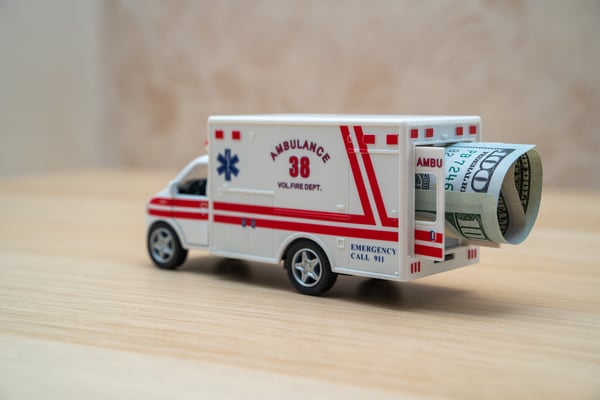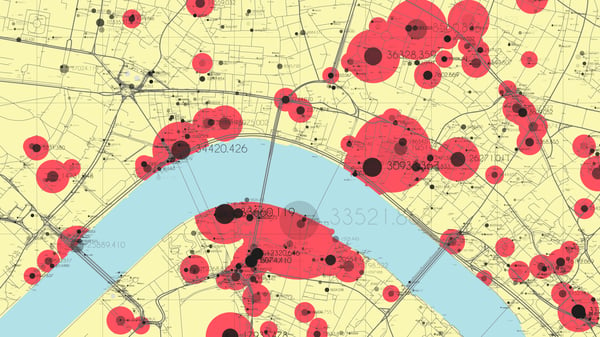4 Must-have Data Points for Dispatch-Billing Alignment and Maximum Reimbursement
How EMS Providers Can Spend CARES Act Relief Funds and Prepare for an Audit
Broad HHS Guidance Covers Coronavirus Response and Lost Revenue
Was this information valuable?

Broad HHS Guidance Covers Coronavirus Response and Lost Revenue
(8 min read) The CARES Act Provider Relief Fund provided a needed bonus of $50 billion to healthcare providers to help them deal with the loss of revenue and added expenses due to the coronavirus pandemic. The money was distributed through two rounds or “tranches.” An initial $30 billion was distributed in April automatically to nearly 320,000 providers who bill for Medicare fee-for-service, and an additional $20 billion was distributed in May and June to 15,000 providers through an application process.

The $50 billion “general distribution” was allocated proportional to the providers' share of 2018 net patient revenue. The allocation methodology was designed to provide relief to providers, who bill Medicare fee-for-service, with at least 2% of that provider's gross patient revenue regardless of the provider's payer mix. Payments were determined based on the lesser of 2% of a provider's 2018 (or most recent complete tax year) net patient revenue or the sum of incurred losses for March and April, according to the the Department of Health and Human Services (HHS)-issued FAQ.
What are Permissible CARES Relief Expenditures?
I get a ton of questions on how EMS agencies can spend CARES Relief money. That’s because there was initially no guidance from HHS except for a very broad description of what the funds could be used for. The Terms and Conditions provided this general guidance: “That the Payment will only be used to prevent, prepare for, and respond to coronavirus, and that the Payment shall reimburse the Recipient only for healthcare related expenses or lost revenues that are attributable to coronavirus.” The language is pretty broad and vague, for sure!

Other than a few other obscure restrictions on what the money could NOT be spent on – such as lobbying, abortion funding, promoting legalization of controlled substances, pornography, and embryo research – there was no specific list of what are considered allowable expenditures. This is unlike most grant programs that EMS agencies encounter, which usually provide detailed lists of specific equipment and items that can be purchased with grant funds. Naturally, the CARES ambiguity creates some anxiety for EMS leadership, since it is not so clear-cut.
In mid-June, HHS finally provided a bit more direction that should give some comfort to agencies that are worried about how they spend the money.
HHS specifically stated that the term "healthcare related expenses attributable to coronavirus" is a broad term that may cover a range of items and services purchased to prevent, prepare for, and respond to coronavirus, including:
- Supplies used to provide healthcare services for possible or actual COVID-19 patients
- Equipment used to provide healthcare services for possible or actual COVID-19 patients
- Workforce training
- Developing and staffing emergency operation centers
- Reporting COVID-19 test results to federal, state, or local governments
- Building or constructing temporary structures to expand capacity for COVID-19 patient care or to provide healthcare services to non-COVID-19 patients in a separate area from where COVID-19 patients are being treated
- Acquiring additional resources, including facilities, equipment, supplies, healthcare practices, staffing, and technology to expand or preserve care delivery. (EMS translation: substation buildings, ambulances, monitor/defibrillators, ventilators, infection control equipment, ANY ambulance equipment and even significant capital expenses would all seem to fit within this general and broad category and would include purchases to expand service delivery capability – as long as those expenses allow your EMS agency to “prevent, prepare for, and respond to coronavirus”).
HHS says that the term "lost revenues that are attributable to coronavirus" means “any revenue that you as a healthcare provider lost due to coronavirus.” This may include revenue losses associated with fewer outpatient visits (EMS translation: decreased number of ambulance, wheelchair, and stretcher transports), canceled elective procedures or services (EMS translation: decline in non-emergency transports, community paramedic visits, and other ancillary revenue like training fees curtailed due to coronavirus), or increased uncompensated care.

Providers can use the payments to cover any cost that the lost revenue otherwise would have covered, as long as that cost prevents, prepares for, or responds to coronavirus. Here is a key point that some have missed in the HHS FAQ: “these costs do not need to be specific to providing care for possible or actual coronavirus patients, but the lost revenue that the Provider Relief Fund payment covers must have been lost due to coronavirus.” HHS further states that it “encourages the use of funds to cover lost revenue so that providers can respond to the coronavirus public health emergency by maintaining healthcare delivery capacity (EMS translation: cost of readiness to prepare for possible increased call volume). Specific examples of categories where funds could be properly used include:
- Employee or contractor payroll (yes, that could mean added overtime costs and hazard pay)
- Employee health insurance
- Rent or mortgage payments
- Equipment lease payments
- Electronic health record licensing fees
What if Your Agency Received More CARES Relief than Expected?
HHS says that if you believe you have received more than you estimated you should have received, but you expect that you will have cumulative lost revenues and increased costs that are attributable to coronavirus during the PHE that exceed the intended calculated payment, then you may keep the money! And, at this point no one has any idea when the PHE will end. Many experts believe it will extend at least beyond the end of 2020, and many say it will continue until a vaccine is readily available to the general public – which may not to be until well into 2021. By any definition, there is lots of time left to expend those funds.

If you don’t have or anticipate having COVID-19-related eligible expenses or lost revenues equal to or in excess of the funds you received, HHS says you should reject the payment in the Provider Relief Fund Attestation Portal and return the entire payment. HHS says you can also contact the Provider Support Line at (866) 569-3522 for step-by-step instructions on returning the payment and receive the correct payment. But keep in mind the payments were estimates, and unless you believe the amount you received is way off the mark, it seems appropriate to keep the funds if you expect future COVID-19 related costs or losses during the PHE.
When Will the Audits Begin?
Eventually, there will be audits to ensure proper use of the funds. All providers that received payments will be required to comply with the reporting requirements described in the Terms and Conditions and specified in future directions issued by HHS. As of this writing, HHS has not issued ANY direction on reporting requirements. HHS says it will provide guidance “in the future” about the type of documentation it expects providers to submit. The “future” could be next week, or months from now.
The Terms and Conditions state that recipients will be required to submit documents to substantiate that the funds were used for increased healthcare-related expenses or lost revenue attributable to coronavirus, and that those expenses or losses were not reimbursed from other sources and other sources were not obligated to reimburse them. HHS says it will have significant anti-fraud monitoring of the funds distributed and that the Office of Inspector General will provide oversight as required in the CARES Act to ensure that Federal dollars are used appropriately. Stay tuned for more on this one, folks.
The Litmus Test: Will HHS Ask Agencies to Give CARES Money Back?
The good news is that it is unlikely that HHS will attempt to recoup payments already made to your agency. The FAQ specifically states that “HHS does not intend to recoup funds as long as the provider’s lost revenue and increased expenses exceed the amount of provider relief funding a provider has received.” The bottom line is this: as long as you don’t have significant funds left over after combining the amount of lost revenue due to coronavirus and any increased expenses you incurred, you should be in good shape.
The key, as with everything in EMS life, is to document, document, and document some more! Keep track of all your COVID-19 related expenses and have reasonable calculations of those losses you incurred so that if you are audited, you can support that you spent the money reasonably and in good faith. Keep in mind that this unprecedented grant of financial support was intended by Congress to help keep healthcare providers afloat and able to serve their communities during this national crisis. It is doubtful that the government bureaucrats will be nitpicking over how you spent the money as long as you spent within the general parameters that we’ve outlined here and which are described in the HHS FAQ.
For more information on the CARES Act, EMS documentation, coding, waivers, and all things COVID-19 visit PWW’s Corona Update web page.
This article is for general information only and is not intended nor should it be relied on as legal advice or a definitive statement of the law. You should consult an attorney for advice specific to your situation.
Related Posts
How EMS Agencies Can Reframe Need and Refocus Resources With Geospatial Analytics
How To Minimize Radio Chatter and Reduce Guesswork With Smarter Dispatch Resource Management
ZOLL Pulse Blog
Subscribe to our blog and receive quality content that makes your job as an EMS & fire, hospital, or AR professional easier.
ZOLL Pulse Blog
Subscribe to our blog and receive quality content that makes your job as an EMS, fire, hospital, or AR professional easier.




